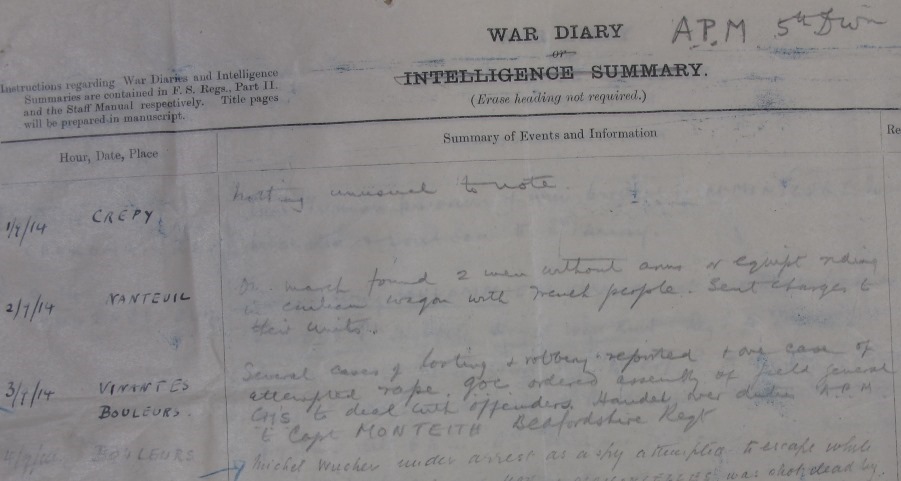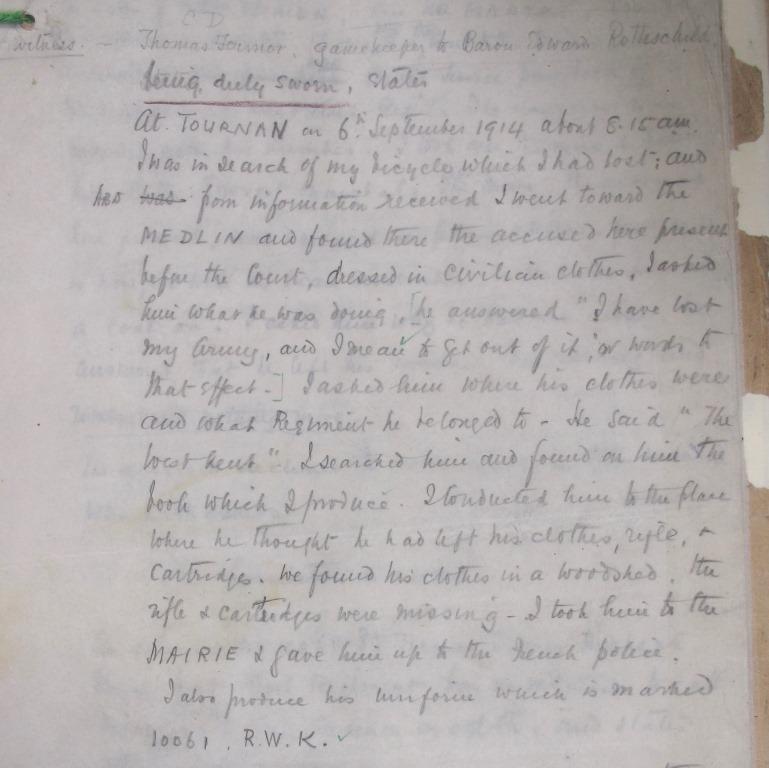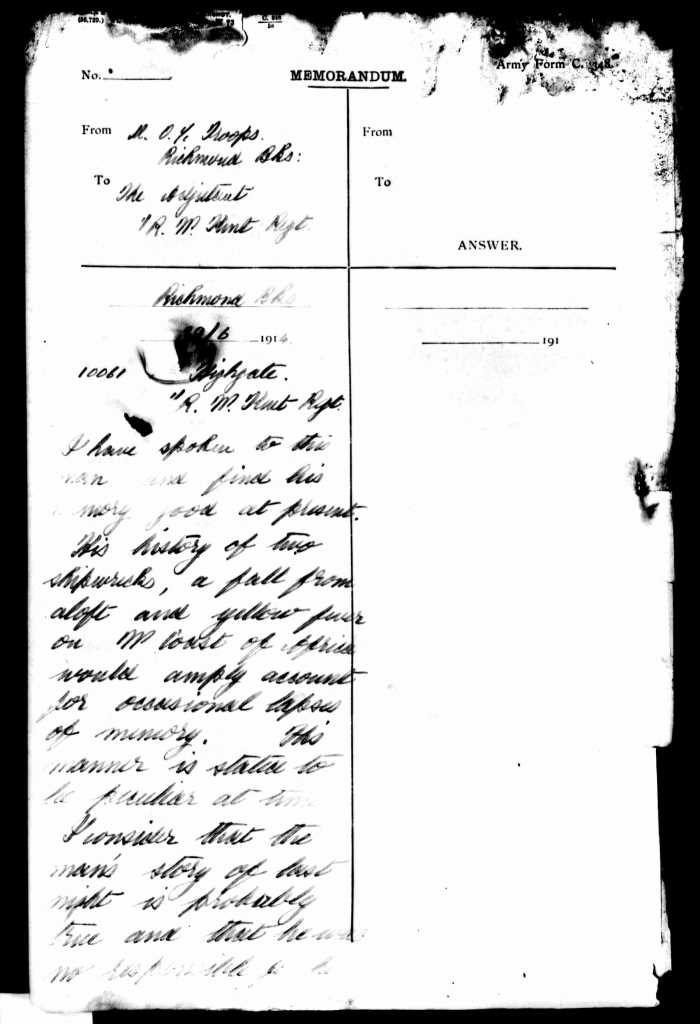‘I have lost my army, and I mean to get out of it’ (WO 71/387).
The words allegedly given by Private Thomas Highgate to a French civilian on 6 September 1914, having deserted the 1st Battalion, Royal West Kent Regiment. 100 years ago today he became the first British soldier to be executed during the First World War.
During the centenary commemorations there will be many difficult and sensitive topics that will be encountered by researchers. Soldiers executed as a result of an act or acts of ill-discipline is just one such topic; a topic which is obviously still a very sensitive one. This blog aims simply to showcase the WO 71 Courts Martial proceedings papers that are open to the public regarding this topic and how working between different records can add to our perspective of the stories that we uncover.
The proceedings papers contain the various documents compiled before, during and after the courts martial was convened. Included will be a mix of correspondence regarding the case, witness statements, and details regarding the sentencing. Additionally, the file for Thomas Highgate, as with all First World War executions for desertion or cowardice, now contains an official pardon which was added by the Ministry of Defence in 2007. The records are original paper based documents, searchable by name of the accused via our online catalogue, Discovery, and can be viewed in our reading rooms or copied by our record copying department.
When Highgate was captured, critically, he was discovered in a small farmhouse, dressed in civilian clothes and without his rifle. When questioned directly by the court, Highgate could not say why he was in civilian clothes. He stated that having lost his regiment he:
‘got strolling about, went down into a farm, lay down in an empty house, and have a slight remembrance of putting some civilian clothes on, but do not remember exactly what happened until the man came down to arrest me’ (WO 71/387).
Likewise, Captain Milward, who had escorted Private Highgate into military custody, described to the court that Highgate had said to him he ‘remembered nothing’ except leaving his bivouac that morning (WO 71/387).
Interestingly, Private Highgate’s service record, a completely separate record collection which is available to view on the Ancestry website, reveals not only a history of desertion prior to the outbreak of war in August 1914 but also a history of memory loss. The Statement of Services sheet in his service record lists a desertion from 28 February 1914 until 4 May, with a signed confession attached confirming that Highgate had attempted to fraudulently re-enlist into the Army at Woolwich. His Army employment sheet records that he was ‘continually absent’ but ‘a good worker’ while he is also recorded as being absent from Tattoo on 7 September 1913 and 1 July 1914 (WO 363/H1561 – Private Thomas James Highgate, 10061, 1st Battalion, Royal West Kent Regiment).
Fascinatingly, a memorandum regarding Private Highgate from June 1914 from Captain Tate, Medical Officer at Richmond Barracks, Ireland, to the Adjutant of the 1st Battalion, Royal West Kent’s, states:
‘I have spoken to this man and find his memory good at present. His history of two shipwrecks [Highgate had been a seaman before joining the Army], a fall from a loft and yellow fever on W[est] coast of Africa would amply account for occasional lapses of memory. His manner is stated to be peculiar at times’ (WO 363/H1561 – Private Thomas James Highgate, 10061, 1st Battalion, Royal West Kent Regiment).
Private Highgate was found guilty of desertion on the 6 September 1914, the day of his arrest. A death sentence was passed but like all such sentences needed to be confirmed by the Commander in Chief. It was during this confirmation process that the majority of death sentences were commuted to lesser sentences during the First World War. Gerald Oram and Julian Putkowski list that between 1914 and 1920 only 361 men were executed from the 3060 cases where a death sentence was initially given – about 11% of cases.[ref] 1. Gerald Oram and Julian Putkowski (ed.), Death Sentences passed by Military Courts of the British Army, 1914-1924, (Francis Boutle; London; 2005), p. 13. [/ref]
Unfortunately for Highgate, there was no such reprieve and the death sentence was to be carried out ‘as publicly as convenient’ (WO 71/387). And here is a key point when analysing death sentences in the British Army. It was not necessarily just about punishing one serious act of ill-discipline, it was also about considering the wider disciplinary concerns of the respective battalion, brigade, division or even Army as a whole, and then setting an example as a result.
In Highgate’s case, his desertion and trial came at a time when the British Expeditionary Force (BEF) were in retreat; a period which saw many men become detached from their battalions, rifles and equipment lost, and even reports of looting. The Unit War Diary of the 5th Division Headquarters records the need stop and pick up ‘stragglers’ on 29 August and 1 September (WO 95/1510/1), while the diary for the Assistant Provost Marshal, 5th Division, reports straggling, robbery, looting, two soldiers without their rifles and riding with civilians, and even one allegation of rape during the last week of August and first week of September (WO 154/33).

WO 154/33: War Diary entry from Assistant Provost Marshal, 5th Division, BEF, confirming reports of straggling, looting, robbery and rape during the first week of September 1914.
Subsequently, with these wider disciplinary concerns within the 5th Division and the wider BEF at this time, a company of men from the 1st Battalion, Cheshire Regiment and 1st Battalion, Dorset Regiment were present to witness the execution of Thomas Highgate, which occurred at 7:07 on the morning of 8 September, carried out by a firing squad from the 1st Battalion, Bedfordshire Regiment (WO 71/387).
Private Thomas Highgate was one of only two men from the West Kent Regiment to be executed during the First World War and the first in the British Army during this conflict. The centenary will contain many sensitive topics, such as this, some of which will still divide opinion. As with all historical periods, discovering sensitive events can be upsetting for living relatives. By piecing together the different records that do survive, however, researchers can gain a better perspective of the stories that they unearth.


These cases of those that were executed are of course in modern times distressing and according to the BBC website Highgate did not have anyone from his unit to defend him and one wonders why the Army took him on in the first place, did no-one see that he was not suitable given his absenses and his memory loss.
Thank you for your comment, David.
Yes, the trial was convened, carried out and had the sentenced confirmed very, very quickly indeed. The key, with this case in mind, was the wider disciplinary concerns of the BEF, which the military authorities were keen to address.
Although his background would suggest that he was a troublesome character, his service record in the Army does record him as a good worker. The 1st Battalion, Royal West Kent Regiment would forge a good reputation in the ealry months, and throughout, the conflict. Their professional training helped ensure a strong performance in the Mons fighting in August 1914, which Highgate would have been apart of.
I hope you enjoyed the blog, and thank you again for your comment.
David Langrish
Of course one reason that courts martial tended to be organised very quickly (in addition to the affects on disciplice already mentioned) was that the army was aware that they needed to be held before witnesses became casualties of further fighting.
Thank you for your comment, David.
Yes, you are quite right. Oram and Putkowski likewise detail how soldiers may actually have spent a couple of weeks back in the trenches before having their sentence confirmed and carried out.
Thank you again for your comment.
David Langrish
[…] Sentenced to death: Private Thomas James Highgate […]
It is distressing to consider his possible mental state as contributing to his uneven behaviour. As an Australian, I am so glad that Aus military command would not permit these executions of its soldiers.
They shot two 16 year olds, these were only children, this was obscene, should have been sent back to England. Unfortunately NZ soldiers were under control of the Red Caps, Australia had more sense.
Thank you Judy and Michael for your comments.
It is a very sensitive issue but hopefully by promoting the different documents that are open to view, researchers can piece together the fuller stories for the individual cases of execution.
There are many published sources which have examined the cases in detail, which are also recommended for consultation.
Thank you again for your comments.
David Langrish
RE. PRIVATE THOMAS HIGHGATE.
The execution of Thomas Highgate is still a very raw and sensitive issue here in West Kent. I understand that the Shoreham British Legion still refuse to have his name on the local memorial. I have just been sent a request from the National British Legion to donate to their EVERY MAN REMEMBERED Campaign and I intend to donate asking that Thomas Highgate be remembered. Other readers of this excellent site may wish to follow suit.
I have only recently been made aware of Thomas Highgate through a book gifted to me called A Flash of Steel. The life and times of John Thompson Wright.
I am absolutely appalled and extremely saddened how Thomas Highgate was treated and eventually executed. Young men died on all sides for no good reason,
on the say so of political psychopaths. It is referred to as the great war . What was so great about it ?
Thomas Highgate is my Great Uncle. My maternal Grandmother’s brother. Two more of his brothers were lost in this war. Can you imagine the anguish of their family.
Some of the statements that I have read that Thomas made remind me of the ways of thinking of my eldest son (also Thomas, named for my Great Uncle). My son has high functioning autism, which would probably not have been a recognised thing in the early 1900s. That mind set of … Well this what I’ve decided is best for me, regardless … Is so typical of this condition. Perhaps, who knows, lost in the mists of time. I understand the misgivings some people may have about his name being added to the Shoreham Memorial. However, he was 19 when he was executed, apparently cried for his mother at the time of execution. I don’t believe the men who gave their lives in that terrible war would have resented the addition Tommy’s name. In my mind it most definitely does not detract from the sacrifice they made.
They are all heroes to me.
Dear Christine Willamson,
I read that Thomas Highgate was your Great Uncle ; I am a History teacher in a secondary school in La Ferté-sous-Jouarre (France), near the cemetery where your Great Uncle war buried. Indeed, we found the grave of Private Thomas J. Highgate while researching the graves of unknown soldiers at the Franco-British military cemetery of Perreuse (Seine-et-Marne, France). He is buried in Grave 1, B, 30 of the cemetery between Privates R. Cowen and G.P. Weiss. On his grave is inscribed “A Soldier of the Great War”. We submitted an identification file for his grave to the CWGC in February 2022 with the British historian Julian Putkowski. I learned that Terence Highgate had passed away, when he was very involved in getting Thomas Highgate’s name put on the Shoreham memorial.
Respectfully,
Guillaume Cousin
History teacher
(if you want to contact me, you can do it from the following website) :
https://fr.findagrave.com/memorial/56240568/thomas-james-highgate/flower
I have read all this with great interest. I too am the great niece of the late Thomas Highgate. Thomas Highgatesbrother Alfred Highgate was my grandfather. I did know of a Terrence Highgate and am sorry for his family’s loss. I did do a programme which was televised on channel 4 with Ian Hislop who was very interested in what happened during WW1. I would very much like to know where my uncle is buried so that my grandchildren can follow it up. I am 80 years old now and have copies of Thomas Highgate’s army records and the details of his execution. My mother passed in1999 without any knowledge of what happened or if she did it was never mentioned to my family.
Dear Pamela Farley, I read your comment with interest, I would like to read the documents on Thomas Highgate that you have in your possession. You can contact me through the following website by clicking on my name (I posted a comment on August 3, 2023, you click on my name and you can send me an email). I could also send you the identification file sent to the CWGC.
Respectfully,
G. Cousin
History teacher
https://fr.findagrave.com/memorial/56240568/thomas-james-highgate/flower#